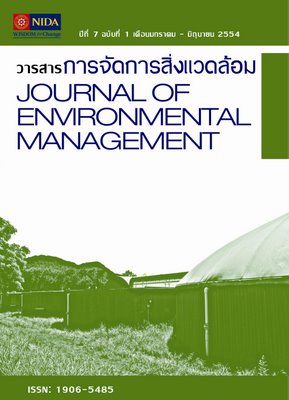การมีส่วนร่วมในโครงการเศรษฐกิจพอเพียงกับการเปลี่ยนแปลงจิตสำนึกและพฤติกรรมการอนุรักษ์ป่าต้นน้ำของชาวไทยภูเขาเผ่ากะเหรี่ยง Participation in Sufficiency Economy Project and Change in Environmental Concern and Conservation Behavior among Thai–Karens
บทคัดย่อ
งาน วิจัยนี้มีวัตถุประสงค์เพื่อศึกษาการเปลี่ยนแปลงจิตสำนึกและพฤติกรรมการ อนุรักษ์ป่าต้นน้ำของชาวไทยภูเขาเผ่ากะเหรี่ยง อันเกิดจากการมีส่วนร่วมในโครงการตามกรอบแนวคิดเศรษฐกิจพอเพียง งานวิจัยนี้อาศัยการรวบรวมข้อมูลจากกลุ่มตัวอย่างที่เป็นหัวหน้าครัวเรือน โดยใช้แบบสอบถาม การสัมภาษณ์เชิงลึก และการสังเกตการณ์ ตลอดจนการวิเคราะห์ข้อมูลเชิงคุณภาพและเชิงปริมาณด้วยวิธีการเปรียบเทียบค่า เฉลี่ย กลุ่มตัวอย่างที่ทำการศึกษาโดยเฉลี่ยแล้วมีการมีส่วนร่วมอยู่ในเกณฑ์ดี จิตสำนึกอยู่ในเกณฑ์ปานกลาง และพฤติกรรมการอนุรักษ์ป่าอยู่ในเกณฑ์ดี ผลการศึกษาพบว่า กลุ่มที่มีการมีส่วนร่วมในเกณฑ์ดีและดีมากจะมีจิตสำนึกอยู่ในเกณฑ์ดี กลุ่มที่มีการมสีว่นรว่มในทุกเกณฑ์จะมีพฤติกรรมการอนุรักษ์ป่าอยู่ในเกณฑ์ดี และกลุ่มที่มีจิตสำนึกในเกณฑ์ปานกลางและดีจะมีพฤติกรรมการอนุรักษ์ป่าใน เกณฑ์ดี นอกจากนี้ยังพบว่า ปัจจัยส่วนบุคคลบางประการ ได้แก่ รายได้ ขนาดที่ดินทำกินและสิทธิถือครองที่ดิน มีผลต่อระดับการมีส่วนร่วม จิตสำนึกและพฤติกรรมการอนุรักษ์ป่า เมื่อพิจารณาแนวโน้มการทำลายป่าที่ลดลง ในช่วงปี พ.ศ. 2543 – 2549 และการฟื้นฟูของป่าต้นน้ำ ตั้งแต่ปี พ.ศ. 2547 สรุปได้ว่า การมีส่วนร่วมในโครงการตามกรอบแนวคิดเศรษฐกิจพอเพียงก่อให้เกิดการเปลี่ยน แปลงจิตสำนึกและพฤติกรรมการอนุรักษ์ป่าต้นน้ำ
This research article aimed at examining change in environmental concern and conservation behavior among Thai-Karens, owing to their participation in a sufficiency economy project. This study relied on in-depth interview, non-participant observation and household survey using semi-structured questionnaire in collecting data, and on descriptive statistics and means comparison tests in analyzing quantitative data. Overall, sample households were high in project participation, average in environmental concern, and high in conservation behavior. The result showed that households who have good and very good participation were high in environmental concern. Those who participated in the project at all levels were high in conservation behavior. Likewise, households with average and good environmental concern were high in conservation behavior. Moreover, the study found some individual attributes, i.e. income, land-holding size and land tenure rights, could affect participation, environmental concern and conservation behavior. A decline in deforestation rate over the 2000 – 2006 period, together with an increase in forest rehabilitation since 2004, had proved that participation in a sufficiency economy project could lead to environmental concern and conservation behavior, which ultimately resulted in improved forest condition as well as people’s livelihoods.



